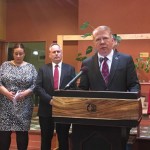“I know there won’t be agreement on all sides, but business as usual has not worked,” Murray said.
“My hope is that this plan will put the squeeze on the problem,” he said.
As he announced his plans for the additional funding raised through property taxes, Murray said, again, that the help he’s been seeking from the federal government isn’t coming.
“It has become clear to me since the presidential election that we are on our own,” he said.
Murray said he formed an advisory group for how to raise $55 million. The city currently spends more than $8 million a year on emergency shelters, more than $4 million a year on transitional housing and more than $9 million a year on permanent supportive housing.
Recently the city released the results of a $100,000 survey of about 1,000 homeless people, and officials with the city’s Human Services Department touted the importance of more affordable housing and more low-barrier shelters.
Murray referred to the survey in a recent news conference, saying that it “busted many of myths” that we have about the homeless. He pointed out that, according to the survey, 40 percent are employed, 20 percent said housing affordability is the main reason they’re homeless, 30 percent are under 30 (years old), 35 percent are suffering from a substance abuse disorder, and 23 percent come from our foster care system, 14 percent are veterans, and 25.5 percent are African Americans.
“We also learned that this is not Freeattle,” Murray said. “70 percent of the people who are homeless lived in this area. They worked and they are our neighbors.”
Murray also said that most — or 90 percent of those surveyed — want services and housing.
KIRO 7 News is tracking community-generated reports of sanctioned and unauthorized camps to help illustrate the size and scope of this crisis. Seattle leaders do not keep a public map of homeless camps. The city’s sanctioned homeless camps are a temporary fix to Seattle’s homeless crisis, according to the mayor’s office.
Murray’s long-term solution, “Pathways Home,” involves expanding 24-hour shelter services and refocusing the city’s homeless solutions to an individual-based approach. The program is expected to take a couple of years to set up.
Meanwhile, the city has implemented a “bridging the gap” program. Seattle only has a handful of sanctioned homeless camps under this program. The rest of the camps that pop up across the city are unauthorized. The city of Seattle defines a camp as three or more tents.
More than 2,000 people are unsheltered in Seattle on any given night, according to the latest homeless count by volunteers.
© Humane Exposures / Susan Madden Lankford










